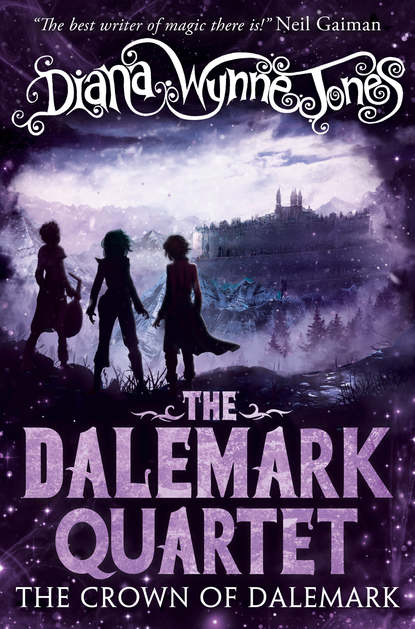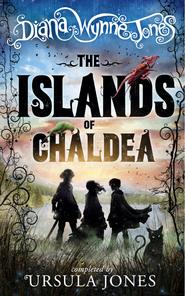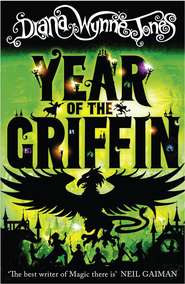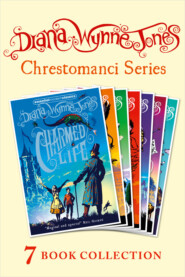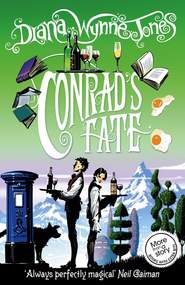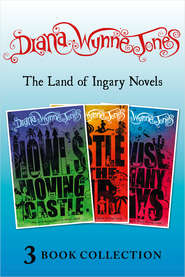По всем вопросам обращайтесь на: info@litportal.ru
(©) 2003-2024.
✖
The Crown of Dalemark
Настройки чтения
Размер шрифта
Высота строк
Поля
Mitt slid down from the Countess-horse and discovered he was more than a little saddle-sore. Ow! he thought. I wonder my pants aren’t smoking! But he did not like to confess this to Rith, who had ridden all the way from Dropwater and was obviously a seasoned hearthman. A small, tough boy, Rith. When they were both on their feet, Rith only came up to Mitt’s shoulders. Makes me look a big booby if I moan, Mitt thought, and he set off dragging the Countess-horse up the hill after Rith. Both horses were huge, heavy and reluctant. Their hooves slid in the slippery grass. Mitt’s horse put its ears back and tried to bite him.
“Stop that!” Mitt slapped its nose aside. “You Countess, you!”
Rith broke into a panting laugh. “What a name! It’s a gelding. O-oh! Piper’s pants!”
Mitt dragged his horse up beside Rith’s. The hill, in the mysterious manner of hills, was twice as high as he had thought. Beyond and above them, it was a huge triangle of earthy boulders and trickling water, which had slid down across the road, blocking it for as far as they could see. At the lower edge of it, the sea twinkled, flat and impassable.
“We’d better go up over the hill,” Rith said. “I know the way. It’ll mean fording the Aden after we cross the green road, but it won’t be deep this high.”
So they struggled on upwards, about twice as high as they had already come, until they left the landslip behind and reached a squishy yellow-green shoulder, where Rith said they could ride again. Mitt nearly yelled as he kicked his way into the saddle. He was raw. But he did not like to mention it. He simply bore it, all the way through a long, marshy valley and then up an endless firm green slope, where they came to one of the things the Northerners called waystones. It was round, like a roughly shaped millstone set up on one edge, with a hole in the middle. Rith leant over and slapped the thing.
“For luck,” he said, grinning. “I’m a superstitious Northerner. I may ask the Wanderer’s blessing too, just to annoy you. There’s the Aden down there. What do you say we stop for some lunch?”
Mitt was only too glad to get down. He helped himself off by hanging on to the waystone, which was a way of touching it without seeming to. He knew he could do with some luck. And once he was down, he was so sore that he had to concentrate on small things, like stripping off his gloves and tucking them into the proper place on his belt, and hitching his horse to the waystone, where someone had tied a piece of red twine through the middle for the purpose. Then, moving in a careful, stiff-legged way, he unbuckled his baggage roll and got out the food they had given him. By then the agony had gone off enough for him to sit down beside Rith, bat the Countess-horse’s nose aside as it tried to eat his bread, and look at the view.
There were hills all around, yellow and green, with sunlight scudding over them in patches. The green way stretched from the waystone, very level and firm and dry, leading south into the mountainous heart of Dalemark, and the Aden rolled parallel with it about a hundred yards downhill from where they sat. It was a fine big river, wider than any Mitt had seen, and the way it rolled quietly along among all those reeds and willow trees suggested that it might be pretty deep. Mitt hoped Rith knew what he was talking about when he said they could ford it. He leant back and sniffed the smell of the river and willows mingling with the damp wild smell of heather and rock, the smell of the North, which Mitt still thought of as the smell of freedom in spite of his disillusionment with the North. Perhaps, he thought, not very hopefully, he would be stuck this side of the river and never get to Adenmouth at all. But that would be the worse for Hildy and Ynen.
“You look pretty gloomy!” Rith said, laughing.
“Just thinking,” Mitt said hurriedly. “What are these green roads? Who made them – really?”
“Kern Adon,” said Rith. “King Hern. They’re the roads of his old kingdom. That’s why they don’t go to places where people live any more. They say that Kern Adon set up the waystones and told the Wanderer to guard the roads, and if you follow them right, they say you arrive at King Hern’s city of gold.”
“I heard them called the paths of the Undying,” said Mitt.
“Oh yes. They’re called that too,” said Rith. “My old nurse used to tell me that the Undying sit in the hole in the waystones. What do you think of that?”
“They couldn’t!” Mitt said unguardedly. “Not unless they shrank.”
Rith got very interested in this idea. “Then how big do you think the Undying are?” he kept saying, in the same coaxing way he had tried to get at Mitt’s opinion of the North. “I’ve never been able to decide. Do you think they’re made of something that isn’t as solid as we are, so that they can be of any size? Or what?”
These Northerners! Mitt thought. Rith was laughing, but he was serious too. They finished eating, and Mitt got up, rather reluctantly, to untie the Countess-horse.
“What size do you think?” Rith said, leading his horse downhill to the river.
“If you must know,” Mitt called over his shoulder, “they’re people-sized. It stands to reason.” He dragged the Countess-horse round to follow Rith. “How could—” He stopped and blinked.
There was no wide rolling river any more. Rith was on his way down to a sunken crease in the hillside that was choked with small oak trees. Mitt could hear water rushing among the trees.
“You’re probably right,” Rith called back, “though some of the things they do make them seem smaller. Come on. It really is quite shallow here.”
Mitt slowly followed him down among the oaks, wondering just what river it was that he had seen. There was no question in his mind that the real Aden was the yelling, stony stream in front of him now, glinting bright coins of sunlight under the trees. Rivers in the North always seemed to crouch like this one along dips in the hills. And he had not seen a single willow tree since he left the South. Shivers ran down his back, and he approached the brawling little Aden very cautiously indeed.
So did the Countess-horse. At the edge of the water it put its ears back, braced its hooves, and refused to move. Mitt called it names.
“I’ll give you a lead,” said Rith. He stepped into the shrilling water, which proved to be only a few inches deep, and waded carefully, watching the stones in the bottom, until he and his horse had become dark shadows, patterned with sun between the oak leaves.
At this point the Countess-horse found it preferred not to be left behind and took off suddenly after Rith, dragging Mitt in sheets of bright water. Mitt kept hold of the reins and managed to stay on his feet until he was halfway across, where his foot turned heavily on something that flashed in the sun.
Rith called out, “Look there!” in a surprisingly deep, strong voice, and dived towards Mitt.
It was all sun-patterned wet confusion. Both horses got away, and Mitt sat down with a splash. Rith plunged his hands down where Mitt’s feet had been and stood up triumphantly holding something that shone. Water poured off his elbows as he held it out for Mitt to see.
“Look at this!”
Mitt floundered to his knees. The thing had evidently once been a little statue – a figurine, Mitt thought the word was. As Rith turned it round, Mitt could see traces of a face and the folds of a robe on the side that was green with river slime. The other side was grated and scratched all over, and that side shone a pure buttery yellow. Mitt in his time had worked enough inlay into gun handles to know what that meant. “It’s solid gold!” he said.
“I think it is,” Rith said. He sounded awestruck. “Who found it? You or me?”
“You picked it up,” Mitt said. “I only stepped on it.”
Rith turned the dripping statuette round again. “I wish I could be sure— Look, may I keep it for now and give you your share when I’ve got it?”
If Mitt had not been so saddle-sore, he might have argued. But the cold water was smarting him like acid, and he could think of almost nothing else. “Fine,” he gasped, and splashed his way across to the far bank, where the horses were standing head to tail, looking pleased with themselves. Rith followed, stowing the wet figurine in the front of his jacket.
“You’re being very generous,” he said several times, as they mounted and rode on. “You really mean I can keep it for now?” He was evidently feeling a strange mixture of doubt and elation, but then anyone would, Mitt thought, who had just picked up a pound of solid gold. He thought Rith was nice to be so bothered about it. All through the next hour or so Rith was either exclaiming at the amazing chance that had led them to that spot or asking Mitt if he really minded waiting for his share. “If it hadn’t been for that landslide,” he said, “we’d never have come this way. Look, are you really sure?”
Mitt got increasingly gruff with him. Mitt’s leathers were wet through and rubbing his soreness until he was convinced he was being flayed. Besides, he thought angrily, the way he was caught in the earls’ plotting, he couldn’t see himself having much use for gold or anything else shortly. He wished Rith would shut up. By the late afternoon, when the sea came into view again blue and crisp to northwards, Mitt was wanting to scream at Rith – and he might have done had they not come out on a headland overlooking Adenmouth to find themselves looking down on an accident.
A Singer’s cart had overturned on the bridge below. The bridge had no sides, and the horse that had pulled the cart was dangling struggling in the Aden. Mitt saw someone pulling uselessly at the horse. A girl lay on the bank as if she might be dead.
“Come on!” shouted Rith, and his shaggy horse was off down the hill as if it was aiming to end in the river too.
Mitt followed as fast as the Countess-horse would let him, which was not very fast. The hill was extremely steep. Even Rith slowed down halfway, but this was probably because he could see that help was on its way. They could see into a long green valley to one side, where a party of people were running from one of the farms. More people were running across a second bridge, from Adenmouth itself, and a horseman was galloping ahead of them.
Everyone converged on the bridge, but the horseman got there first. He was a hearthman in Adenmouth livery. As the Countess-horse slithered cautiously down the last slope, Mitt saw the horseman leap to the ground, thrust his reins into the hands of the red-headed Singer’s boy, and run towards the struggling horse. There he took one look, cocked his pistol, and shot the horse through the head.
Mitt and Rith came down to the bridge while the horse was still jerking. The bang rang in Mitt’s ears like the memory of his worst dreams. The white staring face of the Singer-boy looked just like he felt.
“Anything we can do?” called Rith.
The hearthman turned from slashing at the traces that held the dead horse. Mitt almost laughed. It was Navis. It would be. “Hello,” he said.
Navis nodded at him in his cool way. “You see to that girl,” he said to Rith. “I think she’s alive. Mitt, you help me cut this horse loose.”
As the two of them dismounted, Mitt noticed the Singer himself wandering about on the bank, carefully laying out musical instruments from the overturned cart. A dreamy-looking fellow with a grey beard. Mitt ignored the Singer as useless and hobbled over to Navis, while Rith sprinted to where the Singer-girl was sitting up, holding her head.
“Get your knife out and cut here, then here,” Navis said. He did not seem in the least surprised at seeing Mitt there. His attention was mostly on the accusing yellow-white face of the Singer-boy. “Your horse had broken two legs – look,” he said to the boy. “There was nothing else to be done.”
“He was blind in one eye,” the boy said. “He walked off the bridge.”
“I just wish mine would do that too!” Mitt said, to make him feel better. “Mine’s a right brute.”
The boy simply stared at him. “Southerner,” he said. “You both are.” He turned his back and led Navis’s mare to the other side of the road.
Navis glanced at Mitt. “There’s a lot of prejudice,” he said. “Now cut here.” Mitt slashed away angrily. Cool, cool Navis. He had forgotten just how cool.
By the time they had cut the horse loose, the people from the farm and the town had arrived. There was a lot of typically Northern milling about and talking. The chief talker was a lad from the farm, who wanted everyone to know how quickly he had gone for help to the mansion and what the lady Eltruda had said to him. But amid all this there was unnoticed efficiency. In less than a minute many hands had heaved the neat green cart upright and Mitt was able to read the gold lettering on its side.





